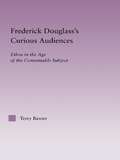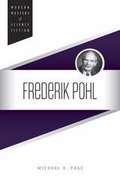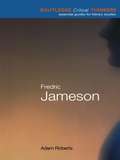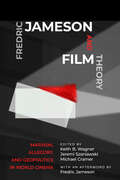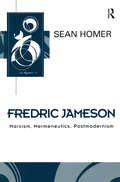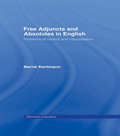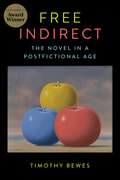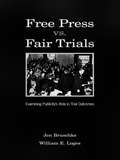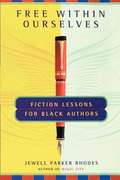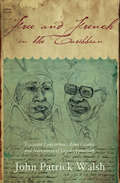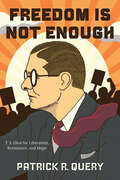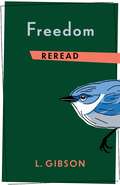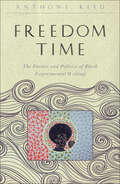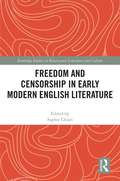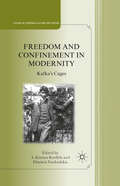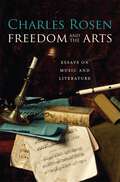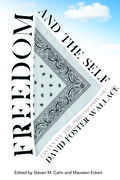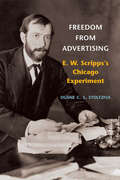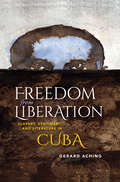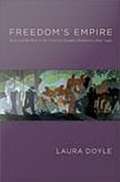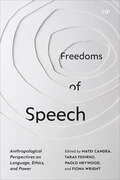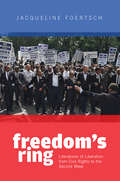- Table View
- List View
Frederick Douglass's Curious Audiences: Ethos in the Age of the Consumable Subject (Studies in Major Literary Authors #35)
by Terry BaxterThis book attempts to answer a fundamental question: How did Douglass manage to persuade anyone about the evils of slavery, and even impress viewers with his personal qualities, when his speeches were commonly considered mere entertainment, in the same category as Barnum's circus acts? In answering this question, Terry Baxter provides a means of understanding the positive responses of Frederick Douglass's white audiences and African American celebrities' roles as both objects of consumption and vehicles for social change.
Frederik Pohl
by Michael R PageOne of science fiction's undisputed grandmasters, Frederik Pohl built an astonishing career that spanned more than seven decades. Along the way he won millions of readers and seemingly as many awards while producing novels, short stories, and essays that left a profound mark on the genre. In this first-of-its-kind study, Michael R. Page traces Pohl's journey as an author but also uncovers his role as a transformative figure who shaped the genre as a literary agent, book editor, and in Gardner Dozois' words, "quite probably the best SF magazine editor who ever lived."
Fredric Jameson (Routledge Critical Thinkers)
by Adam RobertsAn invaluable introduction to the life and work of one of today's most important cultural critics. Studied on most undergraduate literary and cultural studies courses, Fredric Jameson's writing targets subjects from architecture to science fiction, cinema to global capitalism. Of his works, The Political Unconscious remains one of the most widely cited Marxist literary-theoretical texts, and 'Postmodernism, or the cultural logic of late capitalism', is amongst the most influential statements on the nature of post-modernity ever published. Adam Roberts offers an `ngaging introduction to this crucial figure, which will convince any student of contemporary theory that Jameson must be read.
Fredric Jameson and Film Theory: Marxism, Allegory, and Geopolitics in World Cinema
by John Mackay Dudley Andrew Jeremi Szaniawski Fredric Jameson Pansy Duncan Michael Cramer Paul Coates Dan Hassler-Forest Naoki Yamamoto Mike Wayne Keith B. Wagner Alvin K. Wong Mercedes VazquezFrederic Jameson and Film Theory is the first collection of its kind, it assesses and critically responds to Fredric Jameson’s remarkable contribution to film theory. The essays assembled explore key Jamesonian concepts—such as totality, national allegory, geopolitics, globalization, representation, and pastiche—and his historical schema of realism, modernism, and postmodernism, considering, in both cases, how these can be applied, revised, expanded and challenged within film studies. Featuring essays by leading and emerging voices in the field, the volume probes the contours and complexities of neoliberal capitalism across the globe and explores world cinema's situation within these forces by deploying and adapting Jamesonian concepts, and placing them in dialogue with other theoretical paradigms. The result is an innovative and rigorously analytical effort that offers a range of Marxist-inspired approaches towards cinemas from Asia, Latin America, Europe, and North America in the spirit of Jameson's famous rallying cry: 'always historicize!'.
Fredric Jameson: Marxism, Hermeneutics, Postmodernism (Key Contemporary Thinkers Ser.)
by Sean HomerFredric Jameson has been described as "probably the most important cultural critic writing in English today" and he is widely acknowledged as the foremost proponent for the tradition of critical theory known as Western Marxism.Yet his work has not been given the systematic review like other contemporary thinkers like Fooucault and Derrida. Fredric Jameson: Marxism, Hermeneutics, Postmodernism is a thoroughly up-to-date, detailed review and analysis of the work of this influential intellectual. Covering Jameson's work and thought from his early projects of form and history to his more recent engagements with postmodernism and cultural politics, this synthesis offers a balanced assessment of his ideas, their development and their continuing influence.
Free Adjuncts and Absolutes in English: Problems of Control and Interpretation (Germanic Linguistics)
by Bernd KortmannFree adjuncts and absolutes typically function as adverbial clauses which are not overtly specified for any particular adverbial relation. The book is a non-formal, corpus based study of their current use in English. Its particular focus is on a comprehensive and in-depth analysis of their semantic indeterminacy and the syntactic, semantic, and pragmatic factors that help resolve it.
Free Indirect: The Novel in a Postfictional Age (Literature Now)
by Timothy BewesEverywhere today, we are urged to “connect.” Literary critics celebrate a new “honesty” in contemporary fiction or call for a return to “realism.” Yet such rhetoric is strikingly reminiscent of earlier theorizations. Two of the most famous injunctions of twentieth-century writing—E. M. Forster’s “Only connect . . .” and Fredric Jameson’s “Always historicize!”—helped establish connection as the purpose of the novel and its reconstruction as the task of criticism. But what if connection was not the novel’s modus operandi but the defining aesthetic ideology of our era—and its most monetizable commodity? What kind of thought is left for the novel when all ideas are acceptable as long as they can be fitted to a consumer profile?This book develops a new theory of the novel for the twenty-first century. In the works of writers such as J. M. Coetzee, Rachel Cusk, James Kelman, W. G. Sebald, and Zadie Smith, Timothy Bewes identifies a mode of thought that he calls “free indirect,” in which the novel’s refusal of prevailing ideologies can be found. It is not situated in a character or a narrator and does not take a subjective or perceptual form. Far from heralding the arrival of a new literary genre, this development represents the rediscovery of a quality that has been largely ignored by theorists: thought at the limits of form. Free Indirect contends that this self-awakening of contemporary fiction represents the most promising solution to the problem of thought today.
Free Press Vs. Fair Trials: Examining Publicity's Role in Trial Outcomes (Routledge Communication Series)
by Jon Bruschke William Earl LogesCurrent research on media and the law has generally been atheoretical and contradictory. This volume explains why pretrial publicity is unlikely to affect the outcome of most jury trials, despite many experimental studies claiming to show the influence of publicity. It reviews existing literature on the topic and includes results from the authors' own research in an effort to answer four questions: *Does pretrial publicity bias the outcome of trials? *If it has an effect, under what conditions does this effect emerge? *What remedies should courts apply in situations where pretrial publicity may have an effect? *How does pretrial publicity relate to broader questions of justice? Reporting research based on actual trial outcomes rather than on artificial laboratory studies, Free Press vs. Fair Trials examines publicity in the context of the whole judicial system and media system. After a thorough review of research into pretrial publicity, the authors argue that the criminal justice system's remedies are likely to be effective in most cases and that there are much larger obstacles confronting defendants than publicity. This book presents the first extensive study of the influence of pretrial publicity on actual criminal trials, with results that challenge years of experimental research and call for more sophisticated study of the intersection of media and criminal justice. It is required reading for scholars in media law, media effects, legal communication, criminal justice, and related areas.
Free Trade and Sailors' Rights in the War of 1812
by Paul A. GiljeOn July 2, 1812, Captain David Porter raised a banner on the USS Essex proclaiming "A free trade and sailors rights," thus creating a political slogan that explained the War of 1812. Free trade demanded the protection of American commerce, while sailors' rights insisted that the British end the impressment of seamen from American ships. Repeated for decades in Congress and in taverns, the slogan reminds us today that our second war with Great Britain was not a mistake. It was a contest for the ideals of the American Revolution bringing together both the high culture of the Enlightenment to establish a new political economy and the low culture of the common folk to assert the equality of humankind. Understanding the War of 1812 and the motto that came to explain it - free trade and sailors' rights - allows us to better comprehend the origins of the American nation.
Free Within Ourselves: Fiction Lessons for Black Authors
by Jewell Parker RhodesA top-notch writer's guide filled with practical guidance, essays, and journal exercises for the African-American writer including advice from E. Lynn Harris, Charles Johnson, and Yolanda Joe. In her introduction, Jewell Parker Rhodes writes: "Never (in four years of college or five years of graduate school) was I assigned an exercise or given a story example that included a person of color. . . While the educational system and the publishing world have become progressively more welcoming of African-American authors, there is still little attention to educating, supporting, and sustaining the writing process of African-American authors. Free Within Ourselves is a solid first step--it is the book I wished I had when I started out as a writer. It is meant to be a song of encouragement for African-American artists and visionaries. Free Within Ourselves is a step-by-step introduction to fictional technique, exploring story ideas, and charting one's progress, as well as a resource guide for publishing fiction." For the legions of people who have a novel stuck in their word processors, help is finally on the way!Free Within Ourselves is an excellent guide to all the elements necessary to crafting fiction: character development, point of view, plot, atmosphere, dialogue, diction, sentence variety, and revision. Writing techniques are taught using exercises, journaling, story examples, and analyses of famous writing fragments, as well as several complete stories (including those of James Baldwin, Zora Neale Hurston, and Edwidge Dandicat, among others). The book is further enhanced by inspirational advice from successful contemporary black writers (such as Bebe Moore Campbell, Rita Dove, Henry Louis Gates, John Edgar Wideman, and others), a bibliography, and a guide to workshops, journals, magazines, contests, and fellowships supportive of black arts.
Free and French in the Caribbean: Toussaint Louverture, Aimé Césaire, and Narratives of Loyal Opposition (Blacks in the Diaspora)
by John Patrick Walsh&“All the ingredients to become the next important book in the field of postcolonial studies with the emphasis on French Caribbean culture and literature.&”—Daniel Desormeaux, University of Chicago In Free and French in the Caribbean, John Patrick Walsh studies the writings of Toussaint Louverture and Aimé Césaire to examine how they conceived of and narrated two defining events in the decolonializing of the French Caribbean: the revolution that freed the French colony of Saint-Domingue in 1803 and the departmentalization of Martinique and other French colonies in 1946. Walsh emphasizes the connections between these events and the distinct legacies of emancipation in the narratives of revolution and nationhood passed on to successive generations. By reexamining Louverture and Césaire in light of their multilayered narratives, the book offers a deeper understanding of the historical and contemporary phenomenon of &“free and French&” in the Caribbean. &“A fruitful intervention in a growing body of literature and increasingly lively debate on the Haitian Revolution and the figure of Toussaint Louverture, the book also contributes to the emerging scholarship on Césaire, Francophone literature, and postcolonial theory.&”—Gary Wilder, CUNY Graduate Center &“A valuable contribution to both the rapidly proliferating literature on the Haitian Revolution and the emerging revisionist appreciation of Césaire&’s intellectual and political project.&”—Small Axe &“J.P. Walsh has produced for the nonspecialist reader an excellent analysis of the historiographical discourse on Toussaint Louverture and Aimé Césaire with a focus on the meaning(s) of decolonization in the late eighteenth and mid-twentieth centuries.&”—New West Indian Guide &“That Free and French inspires so many questions is testament to its ambition, the provocative parallel at its heart, and the richness of Walsh&’s analysis.&”—H-Empire
Free to Be You and Me
by Marlo ThomasComics, songs and the stories that give messages to young children why they are in this world.
Freedom Is Not Enough: T. S. Eliot for Liberation, Resistance, and Hope
by Patrick R. QueryHow does literature from the past speak to the present? What can we, as readers committed to combatting oppression, learn from figures whose writing we love but some of whose beliefs we may oppose? Quite a lot, according to Patrick R. Query. To make this case, Query turns to a writer and critic as canonical as he is controversial—T. S. Eliot. Passionately argued and eminently readable, Freedom Is Not Enough shows how Eliot makes a surprising yet vital ally in the struggle to fill the world with more freedom, equality, and human dignity. Without ignoring or downplaying the bigotry and elitism that are ineluctable parts of Eliot's legacy, Query argues that we need today what Eliot has to teach us: about migration, peace, friendship, radicalism, anti-fascism, liberation, resistance, and hope. Drawing on the full scope of Eliot's oeuvre—from his most well-known poetry and prose to newly available archival materials—Freedom Is Not Enough demonstrates how to use Eliot and literature more broadly to confront the forces conspiring to turn our world into a waste land.
Freedom Reread (Rereadings)
by L. GibsonFew writers rankle like Jonathan Franzen. Despite popular acclaim, robust sales, and august literary laurels, Franzen’s polarizing persona shares the spotlight with—and sometimes steals it from—his tragicomic novels of Midwestern family life.In this reconsideration of Freedom (2010), L. Gibson explores the difficulty of coming to terms with Jonathan Franzen. Freedom Reread considers the author’s distinctive narrative technique in light of the contradictions for which he is renowned: widely read curmudgeon, tweeted-about luddite, self-proclaimed partisan of fiction who frequently announces the novel’s death. Bookended by autofictional forays into the process of—and resistance to—taking a definite stance on Franzen, this book places Freedom in conversation with a playful, idiosyncratic array of interlocutors, including Middlemarch and You’ve Got Mail, Amitav Ghosh on climate change and Susan Sontag on metaphor, speculative fiction and Succession.Avowedly ambivalent about Franzen, Gibson offers both a fresh appreciation of the author’s work and a searching critical analysis of his pronouncements on the novel’s fate. Wide-ranging and stylistically ambitious, Freedom Reread delivers an assured, artful inquiry into Franzen’s novelistic technique and public persona.
Freedom Time: The Poetics and Politics of Black Experimental Writing (The <I>Callaloo</I> African Diaspora Series)
by Anthony ReedExperimental poetry and prose by black writers reject traditional interpretations of social protest and identity formation to reveal radical new ways of perceiving the world.Winner, 2016 William Sanders Scarborough Prize, Modern Language AssociationStandard literary criticism tends to either ignore or downplay the unorthodox tradition of black experimental writing that emerged in the wake of protests against colonization and Jim Crow–era segregation. Histories of African American literature likewise have a hard time accounting for the distinctiveness of experimental writing, which is part of a general shift in emphasis among black writers away from appeals for social recognition or raising consciousness. In Freedom Time, Anthony Reed offers a theoretical reading of "black experimental writing" that presents the term both as a profound literary development and as a concept for analyzing how writing challenges us to rethink the relationships between race and literary techniques. Through extended analyses of works by African American and Afro-Caribbean writers—including N. H. Pritchard, Suzan-Lori Parks, NourbeSe Philip, Kamau Brathwaite, Claudia Rankine, Douglas Kearney, Harryette Mullen, and Nathaniel Mackey—Reed develops a new sense of the literary politics of formally innovative writing and the connections between literature and politics since the 1960s. Freedom Time reclaims the power of experimental black voices by arguing that readers and critics must see them as more than a mere reflection of the politics of social protest and identity formation. With an approach informed by literary, cultural, African American, and feminist studies, Reed shows how reworking literary materials and conventions liberates writers to push the limits of representation and expression.
Freedom and Censorship in Early Modern English Literature (Routledge Studies in Renaissance Literature and Culture)
by Sophie ChiariBroadening the notion of censorship, this volume explores the transformative role played by early modern censors in the fashioning of a distinct English literature in the sixteenth and seventeenth centuries. In early modern England, the Privy Council, the Bishop of London and the Archbishop of Canterbury, the Stationers’ Company, and the Master of the Revels each dealt with their own prerogatives and implemented different forms of censorship, with the result that authors penning both plays and satires had to juggle with various authorities and unequal degrees of freedom from one sector to the other. Text and press control thus did not give way to systematic intervention but to particular responses adapted to specific texts in a specific time. If the restrictions imposed by regulation practices are duly acknowledged in this edited collection, the different contributors are also keen to enhance the positive impact of censorship on early modern literature. The most difficult task consists in finding the exact moment when the balance tips in favour of creativity, and the zone where, in matters of artistic freedom, the disadvantages outweigh the benefits. This is what the twelve chapters of the volume proceed to do. Thanks to a wide variety of examples, they show that, in the Elizabethan and Jacobean eras, regulations seldom prevented writers to make themselves heard, albeit through indirect channels. By contrast, in the 1630s, the increased supremacy of the Church seemed to tip the balance the other way.
Freedom and Confinement in Modernity
by Dimitris Vardoulakis A. Kiarina KordelaKafka's literary universe is organized around constellations of imprisonment. Freedom and Confinement in Modernity proposes that imprisonment does not signify a tortured state of the individual in modernity. Rather, it provides a new reading of imprisonment suggesting it allows Kafka to perform a critique of a modernity instead.
Freedom and the Arts: Essays on Music and Literature
by Charles RosenIs there a moment in history when a work receives its ideal interpretation? Or is negotiation always required to preserve the past and accommodate the present? The freedom of interpretation, Charles Rosen suggests in these sparkling explorations of music and literature, exists in a delicate balance with fidelity to the identity of the original work. Rosen cautions us to avoid doctrinaire extremes when approaching art of the past. To understand Shakespeare only as an Elizabethan or Jacobean theatergoer would understand him, or to modernize his plays with no sense of what they bring from his age, deforms the work, making it less ambiguous and inherently less interesting. For a work to remain alive, it must change character over time while preserving a valid witness to its earliest state. When twentieth-century scholars transformed Mozart's bland, idealized nineteenth-century image into that of a modern revolutionary expressionist, they paradoxically restored the reputation he had among his eighteenth-century contemporaries. Mozart became once again a complex innovator, challenging to perform and to understand. Drawing on a variety of critical methods, Rosen maintains that listening or reading with intensity-for pleasure-is the one activity indispensable for full appreciation. It allows us to experience multiple possibilities in literature and music, and to avoid recognizing only the revolutionary elements of artistic production. By reviving the sense that works of art have intrinsic merits that bring pleasure, we justify their continuing existence.
Freedom and the Self
by Steven M. Cahn Maureen EckertThe book Fate, Time, and Language: An Essay on Free Will, published in 2010 by Columbia University Press, presented David Foster Wallace's challenge to Richard Taylor's argument for fatalism. In this anthology, notable philosophers engage directly with that work and assess Wallace's reply to Taylor as well as other aspects of Wallace's thought.With an introduction by Steven M. Cahn and Maureen Eckert, this collection includes essays by William Hasker (Huntington University), Gila Sher (University of California, San Diego), Marcello Oreste Fiocco (University of California, Irvine), Daniel R. Kelly (Purdue University), Nathan Ballantyne (Fordham University), Justin Tosi (University of Arizona), and Maureen Eckert. These thinkers explore Wallace's philosophical and literary work, illustrating remarkable ways in which his philosophical views influenced and were influenced by themes developed in his other writings, both fictional and nonfictional. Together with Fate, Time, and Language, this critical set unlocks key components of Wallace's work and its traces in modern literature and thought.
Freedom and the Self: Essays on the Philosophy of David Foster Wallace
by Steven M. Cahn Eckert MaureenThe book Fate, Time, and Language: An Essay on Free Will, published in 2010 by Columbia University Press, presented David Foster Wallace's challenge to Richard Taylor's argument for fatalism. In this anthology, notable philosophers engage directly with that work and assess Wallace's reply to Taylor as well as other aspects of Wallace's thought.With an introduction by Steven M. Cahn and Maureen Eckert, this collection includes essays by William Hasker (Huntington University), Gila Sher (University of California, San Diego), Marcello Oreste Fiocco (University of California, Irvine), Daniel R. Kelly (Purdue University), Nathan Ballantyne (Fordham University), Justin Tosi (University of Arizona), and Maureen Eckert. These thinkers explore Wallace's philosophical and literary work, illustrating remarkable ways in which his philosophical views influenced and were influenced by themes developed in his other writings, both fictional and nonfictional. Together with Fate, Time, and Language, this critical set unlocks key components of Wallace's work and its traces in modern literature and thought.
Freedom from Advertising: E. W. Scripps's Chicago Experiment (History of Communication)
by Duane C.S. StoltzfusDisgusted by publishers and editors who refused to cover important stories for fear of offending advertisers, the press baron E. W. Scripps rejected conventional wisdom and set out to prove that an ad-free newspaper could be profitable entirely on circulation. Duane C. S. Stoltzfus’s Freedom from Advertising details the history of Scripps’s innovative 1911 experiment, which began in Chicago amid great secrecy. The tabloid-sized newspaper was called the Day Book, and at a penny a copy, it aimed for a working-class market, crusading for higher wages, more unions, safer factories, lower streetcar fares, and women’s right to vote. It also tackled the important stories ignored by most other dailies, like the labor conflicts that shook Chicago in 1912. Though the Day Book’s financial losses steadily declined over the years, it never became profitable, and publication ended in 1917. Nevertheless, Stoltzfus explains that the Day Book served as an important ally of workers, a keen watchdog on advertisers, and it redefined news by providing an example of a paper that treated its readers first as citizens with rights rather than simply as consumers.
Freedom from Liberation: Slavery, Sentiment, and Literature in Cuba (Blacks in the Diaspora)
by Gerard Aching“Delves into the life and work of Juan Francisco Manzano, the enslaved Cuban poet and author of Spanish America’s only known slave narrative . . . Valuable.” —ChoiceBy exploring the complexities of enslavement in the autobiography of Cuban slave-poet Juan Francisco Manzano (1797–1854), Gerard Aching complicates the universally recognized assumption that a slave’s foremost desire is to be freed from bondage. As the only slave narrative in Spanish that has surfaced to date, Manzano’s autobiography details the daily grind of the vast majority of slaves who sought relief from the burden of living under slavery. Aching combines historical narrative and literary criticism to take the reader beyond Manzano’s text to examine the motivations behind anticolonial and antislavery activism in pre-revolution Cuba, when Cuba’s Creole bourgeoisie sought their own form of freedom from the colonial arm of Spain.
Freedom's Empire: Race and the Rise of the Novel in Atlantic Modernity, 1640-1940
by Laura DoyleIn this pathbreaking work of scholarship, Laura Doyle reveals the central, formative role of race in the development of a transnational, English-language literature over three centuries. Identifying a recurring freedom plot organized around an Atlantic Ocean crossing, Doyle shows how this plot structures the texts of both African-Atlantic and Anglo-Atlantic writers and how it takes shape by way of submerged intertextual exchanges between the two traditions. For Anglo-Atlantic writers, Doyle locates the origins of this narrative in the seventeenth century. She argues that members of Parliament, religious refugees, and new Atlantic merchants together generated a racial rhetoric by which the English fashioned themselves as a "native," "freedom-loving," "Anglo-Saxon" people struggling against a tyrannical foreign king. Stories of a near ruinous yet triumphant Atlantic passage to freedom came to provide the narrative expression of this heroic Anglo-Saxon identity--in novels, memoirs, pamphlets, and national histories. At the same time, as Doyle traces through figures such as Friday in Robinson Crusoe, and through gothic and seduction narratives of ruin and captivity, these texts covertly register, distort, or appropriate the black Atlantic experience. African-Atlantic authors seize back the freedom plot, placing their agency at the origin of both their own and whites' survival on the Atlantic. They also shrewdly expose the ways that their narratives have been "framed" by the Anglo-Atlantic tradition, even though their labor has provided the enabling condition for that tradition. Doyle brings together authors often separated by nation, race, and period, including Aphra Behn, Eliza Haywood, Olaudah Equiano, Nathaniel Hawthorne, Harriet Wilson, Pauline Hopkins, George Eliot, and Nella Larsen. In so doing, she reassesses the strategies of early women novelists, reinterprets the significance of rape and incest in the novel, and measures the power of race in the modern English-language imagination.
Freedoms of Speech: Anthropological Perspectives on Language, Ethics, and Power (Studies in the Anthropology of Language, Sign, and Social Life)
by Fiona Wright Paolo Heywood Matei Candea Taras FedirkoBringing together leading anthropologists, this collection sheds light on the vast topic of freedoms of speech from a comparatively human perspective. Freedoms of Speech provides a sustained, empirical exploration of the variety of ways freedom of speech is lived, valued, and contested in practice; envisioned as an ideal; and mediated by various linguistic, ethical, and material forms. From Ireland to India, from Palestine to West Papua, from contemporary Java to early twentieth-century Britain, and from colonial Vietnam to the contemporary United States, the book broadly interrogates the classic vision of a singular “Western liberal tradition” of freedom of speech, exploring its internal complexities and highlighting alternative perspectives on the relationship between speech, freedom, and constraint in other times and places. Chapters analyse subjects commonly linked to freedom-of-speech debates, shedding new light on familiar topics that include campus speech codes, defamation, and press freedom, while also exploring unexpected ones such as therapy, gift-giving, and martyrdom. These analyses not only provide unexpected perspectives and unique insights but also address a myriad of questions, contributing to a rich, interdisciplinary, and human understanding of the nature of freedom of speech.
Freedom’s Ring: Literatures of Liberation from Civil Rights to the Second Wave
by Jacqueline FoertschFreedom’s Ring examines the debate between “freedom” and “equality” in popular texts from the Black Power, antiwar/ counterculture, and women’s liberation movements of the 1960s and 1970s. Its central finding is that although many struggled and died for it in the civil rights era, freedom (e.g., the vote, integrated bus rides, sex without consequences via the Pill) is ultimately free—costing officialdom little if anything to fully implement—while equality (with respect to jobs, salaries, education, housing, and health care) will forever be the much more expensive nut to crack.
